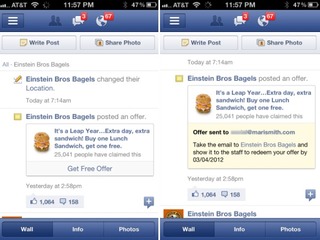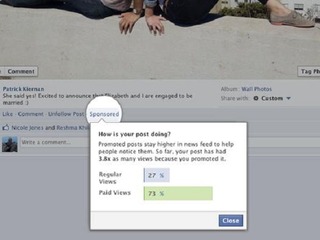The FDA outlines draft guidance on AI for medical devices
The agency also published draft guidance on the use of AI in drug development
Read more...
Facebook has been rolling out feature after feature recently to shore up revenue lately, by making businesses pay to run offer, allowing users to send gifts, and paying to sponsor their stories.
But are Facebook’s efforts working?
A new survey from Sterne Agee, which asked 750 Facebook users how they felt about the company’s mobile platform and its new features, it showed that so far it has been a mixed bag. People are embracing one of Facebook’s ideas, while completely dismissing another.
Gifts
Last month, Facebook announced a service that would allow users to send each other real gifts, as opposed to virtual objects, which was how the service used to work.
The way it works is that a user decides to buy someone else a gift, so they will go that person’s timeline and click the Gift button at the top. They select a card, add a personal message and then send the gift. The recipient will be notified, and asked for their address. The gift can be paid for immediately, or the sender can choose to wait until the recipient enters their info.
The sender will never see the address of the person he or she is sending the gift to and the person receiving the gift won’t see the price. They can also change the size, color and style of the gift.
Facebook is offering hundreds of gifts, including cupcakes from Magnolia Bakery, a stuffed animal from Gund, a digital gift card from Starbucks, cookies, household goods, t-shirts and posters.
When asked, 45% of the respondents said that they would consider using the new Gift feature. While only 5.3% said that they were either highly or very likely to use it, 39.6% of respondents said that they were moderately or slightly likely to buy a gift for a friend. The remaining 55.1 said that they would be “not at all likely” to purchase a gift through Facebook.
Only 38% of the heaviest Facebook users, those in the 18-29 year old range, said that they woiuld be willing to use this service.

Still, Stern Agee said in the report that it believes Gifts is “an area of tremendous opportunity for Facebook,” which could allow it to “diversify its revenues away from advertising and should lessen the impact of the shift towards mobile.”
“Additionally, launching Facebook Gifts could signal Facebook’s entry into the large e-commerce market.”
Promoted Posts
While Gifts has around half of those surveyed at least somewhat interested in using the feature, the same cannot be said of promoted posts.
Earlier this month, Facebook began testing a feature that would allow users to pay Facebook to promote their stories by having them pushed to the top of the News Feed for a fee.
When Promoted Posts were first announced, I worried that the feature might be abused and suggested that Facebook put limits on the number of times a status can be promoted in a certain amount of time.
Those worries, I now see, were premature, since when Sterne Agee asked about the likelihood of this service being used the answer was clear: 83.6% said they would pay nothing to promote their posts. Not one dollar.
The price of a promoted post right now seems to be around $7 (at least that’s what it told me I would have to pay), but a spokesperson from Facebook would not confirmed this to VatorNews, telling us when the story first broke that Facebook is "considering a variety of prices."
Given that only 2.5% of people said that they would pay $5 or more to promote a post, it seems like Facebook will have to go much lower.

According to Sterne Agee, there is “significant opportunity for Facebook Pages to promote posts,” but not nearly as much for personal profiles.
Search
While giving his first interview since Facebook’s IPO in May at TechCrunch Distrupt last month, CEO Mark Zuckerberg spoke about Facebook getting into search.
If Facebook does do this, and it is looking more and more likely that it will, it may be a good strategy on its part.
Nearly half, 47%, of the respondents in the survey said that they would consider using a Facebook search engine.

Interestingly, the younger demographic, those 18 to 29 years old, said that they were less likely to use a search engine developed by Facebook, with only 34% saying they would.
Mobile
Facebook was at one point so worried about its lack of mobile strategy that it reportedly tried to hide those problems from investors (spoiler alert: it didn’t work.) So now the company is totally focused on mobile, as Zuckerberg said it would be.
When asked about their satisfaction regarding Facebook’s mobile app, the social media giant has to be pretty happy with the results.
With 44.4% saying that they were “moderately satisfied,” and 33.2% either extremely or very satisfied, the Facebook mobile app seems to be a big success, though Sterne Agee thinks the percent of those who are “extremely satisfied” needs to go up, and that “there is considerable room for improvement.”

On top of that, the app has high engagement. 61% of the 750 users have the Facebook mobile app and 64% of them access it at least once a day.

Facebook could not be reached for comment.
The agency also published draft guidance on the use of AI in drug development
Read more...The biggest focus areas for AI investing are healthcare and biotech
Read more...It will complete and submit forms, and integrate with state benefit systems
Read more...




